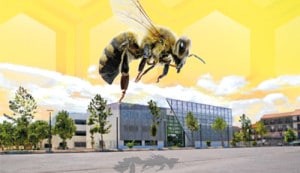Bees buzzing at Béziers IUT
Since June 1, 2015, the Béziers IUT has installed two Caucasian bee hives on its roof for educational and research purposes.
 The project has a number of aims: to help raise awareness of the decline in bee numbers among students and the general public; to contribute to the protection of local biodiversity through the pollinating role of bees; to mobilize teaching teams and students around a range of innovative educational projects linked to "communicating hives"; and to participate in innovative technical, technological and scientific projects linked to the world of beekeeping and research.
The project has a number of aims: to help raise awareness of the decline in bee numbers among students and the general public; to contribute to the protection of local biodiversity through the pollinating role of bees; to mobilize teaching teams and students around a range of innovative educational projects linked to "communicating hives"; and to participate in innovative technical, technological and scientific projects linked to the world of beekeeping and research.
An apiary 2.0!
"You've got an e-miel!" This is the name of IUT's federative project that will connect beehives to the Internet. The concept is simple: the beehives are equipped with sensors, cameras and other measuring instruments that enable the beekeeper, researcher or citizen to monitor, analyze or simply observe them. The aim of the experiment is to provide researchers with new tools to better understand CCD (Colony Collapse Disorder).
Students from the IUT's three departments: networks and telecommunications, marketing techniques, multimedia and Internet professions, will be working on study projects to develop a communicating beehive, connected to the Internet, broadcasting its images and physical parameters (temperature, hygrometry, etc.). The aim is to put this new kind of beehive into production in spring 2016.
In the context of this project, the IUT is in contact with leading scientific research laboratories on these issues, and their teams have contributed to drawing up the project specifications.
The decline of honey bees
Particularly visible in Europe since the early 2000s, this syndrome takes the form of hives suddenly emptied of almost all their bees at the end of winter, or even during the mild season. This shock is of course of concern to beekeepers, but also to ecologists and other agronomic experts, because of the consequences of the lack of pollination on our agricultural economy. According to the French National Institute for Agronomic Research (INRA), 84% of the crops grown in Europe depend directly on pollinators, over 90% of which are bees.